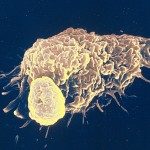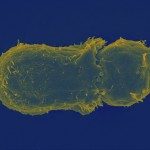Link to Pubmed [PMID] – 29540686
Nat Commun 2018 03;9(1):1080
CD28 superagonistic antibodies (CD28SAb) can preferentially activate and expand immunosuppressive regulatory T cells (Treg) in mice. However, pre-clinical trials assessing CD28SAbs for the therapy of autoimmune diseases reveal severe systemic inflammatory response syndrome in humans, thereby implying the existence of distinct signalling abilities between human and mouse CD28. Here, we show that a single amino acid variant within the C-terminal proline-rich motif of human and mouse CD28 (P in human vs. A in mouse) regulates CD28-induced NF-κB activation and pro-inflammatory cytokine gene expression. Moreover, this YAPP sequence in humans is crucial for the association of CD28 with the Nck adaptor protein for actin cytoskeleton reorganisation events necessary for CD28 autonomous signalling. This study thus unveils different outcomes between human and mouse CD28 signalling to underscore the importance of species difference when transferring results from preclinical models to the bedside.


